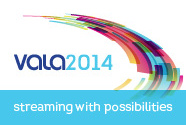We built it and they are coming: the development of eResearch@FlindersVALA2014 CONCURRENT SESSION 12: Learning Amanda Nixon, Liz Walkley Hall, Ian McBain, Richard Constantine and Colin CaratiFlinders University, SA Please tag your comments, tweets, and blog posts about this session: #vala14 and #s35 |  |
| View the presentation VALA2014 Session 12 Nixon on the VALA2014 GigTV channel |
Abstract
This paper discusses the planning,implementation and staffing of a new area of the Flinders University Library to support researcher uptake of eResearch tools and services. Building on new expertise developed in the completion of Australian National Data Service projects and drawing on traditional library skills in metadata creation and validation, repository management, open scholarship and researcher engagement, librarians in eResearch@Flinders provide data management support, a point of contact for external eResearch services providers, support for eResearch strategic decision making, repository services and eResearch liaison.

This work is licensed under a Creative Commons Attribution-NonCommercial License.
